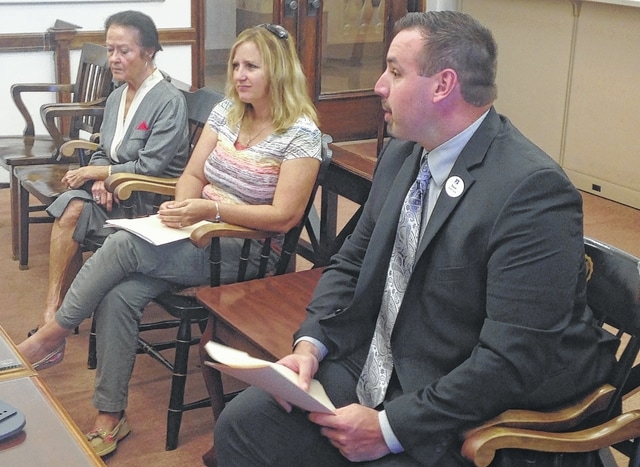

By Nathan Kraatz
WILMINGTON — Members of Clinton County’s agriculture scene petitioned the Clinton County commissioners to consider federal conservation programs as eligible for agricultural taxes.
Current Agricultural Use Value (CAUV) taxes value farmland according to its current use, as determined by a formula that factors in crop prices, among other variables, instead of at its “highest and best” potential use, like most property. Doing so sets tax values below ordinary market values, which “results in a substantially lower tax bill for working farmers,” according to the Ohio Department of Taxation.
“Recently we’ve had issues with federal conservation programs being considered ineligible for CAUV,” said Organization Director Steven Berk, with the Ohio Farm Bureau. “Current law says that only land used exclusively for agricultural purposes may qualify for assessment, according to its CAUV value.”
Berk said the Ohio Department of Taxation includes conservation programs under agreement with the federal government as CAUV-eligible.
“We think it states very clear that land in a conservation program is included in CAUV,” Berk said. “But what we’re seeing across the state is that we are having issues where certain programs are having people decide” they aren’t eligible.
County auditors determine whether a property is eligible for CAUV valuation, but Clinton County Auditor Terry Habermehl told the Wilmington News Journal that when he determines whether a program is eligible for CAUV taxation, he does so using directives from the Ohio Department of Taxation.
He also said there was language in the recently proposed Ohio Senate budget bill that would value conservation land at the lowest taxable value, which Habermehl thought was inappropriate.
“I don’t believe that should be thrown in a budget bill. I think it should be separate legislation. … It should be debated on its own merits,” Habermehl said.
“The big reason that we’re seeing across the state as to why some programs are not eligible and others are, is … that they cannot be returned to agricultural use,” Berk said. “However, that’s not the intent.”
“I don’t disagree that land that’s permanently set aside should be reduced in value,” Habermehl said.
The state’s top justice officials have themselves previously split over the phrase “agricultural use.”
Though the 11th Appellate District ruled in favor of defining a wetland preservation as CAUV-eligible, then-Attorney General Richard Cordray’s office wrote, in a legal opinion, “Although the court … reached a contrary result, we conclude that land used as a wetland mitigation bank is not ‘devoted exclusively to agricultural use.’”
Commissioners on Monday also:
• Appropriated $43,500, which will pay for two water heaters for the Clinton County Jail, which was also approved for purchase.
• Held a number of contracts for Clinton County Job and Family Services so their attorney, Andrew McCoy, can review them. There are four contracts, each not to exceed $90,000 that pay for transit services.
• Entered into a $598,000 contract with Miller Mason Paving Company for roadway sealing.
• Discussed the possible need for a new wheelchair-accessible van for the Veterans Service Commission (VSC). The VSC’s only wheelchair-accessible van broke down a few miles from the Chillicothe VA Medical Center. The van’s condition had not yet been determined at the time of the commissioners’ discussion.
Reach Nathan Kraatz at 937-382-2574, ext. 2510 or on Twitter @NathanKraatz.

